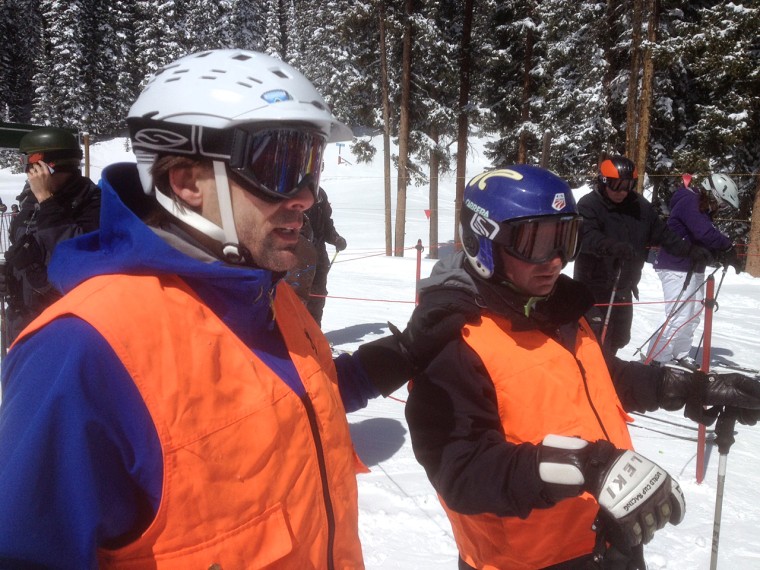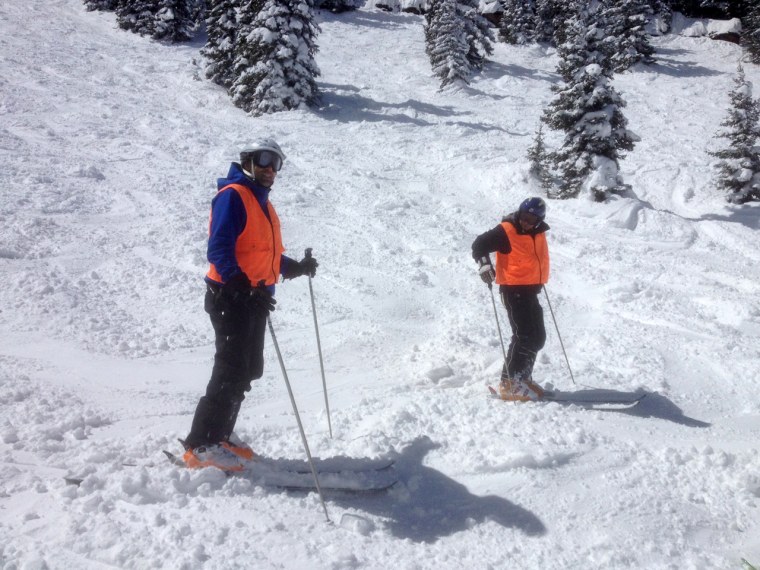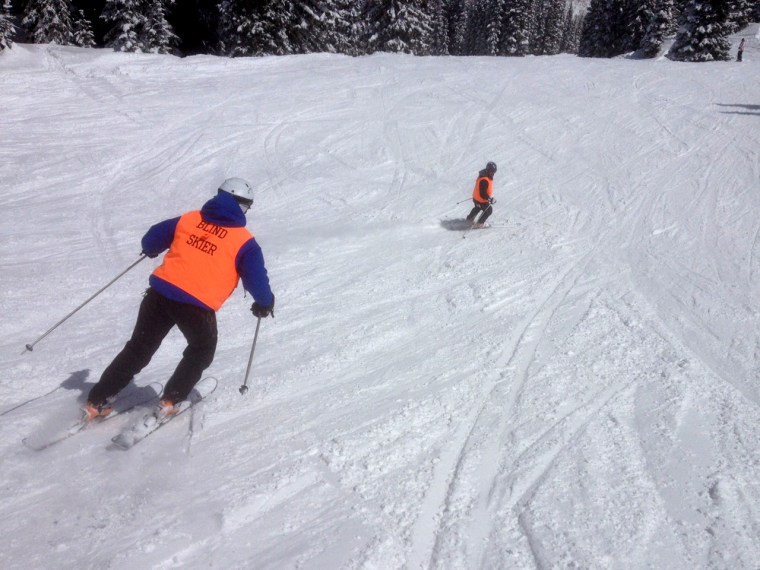
Last Friday was a perfect spring skiing day in Colorado: blue skies, warm sunshine, a brightly dressed crowd at Vail's ski area, and two feet of fresh snow. It was the beginning of the "last weekend" for skiing in the Rockies before all the resorts close up for the season. But Eric Weihenmayer could see none of it.
Still, even though he is blind, Weihenmayer missed very little of the sun-drenched day on the mountain.
"Are we in some trees?" Weihenmayer asked me as we rode the chairlift.
"Uh, yes." I said, "We are just coming through a grove of evergreens near the ridge line at the top of this peak." I had been looking over the ski terrain and hadn't noted that the chair lift was about to leave the wide open spaces of Vail's Sundowner Bowl and thread through the trees to the drop-off point.
“I can hear echoes,” Weihenmayer said. He was referring to echolocation, where sound vibrations bounce off objects and come back at you. It’s a concept that is very important to the blind. “I love it when you are in the trees and you can hear that the snow muffles everything. Everything is soft.”
Weihenmayer lost his sight at the age of 13, long before he took up skiing, but he never lost his sense of adventure. Considered one of the most accomplished blind outdoorsmen in the world, he became the first blind person to climb Mt. Everest in 2001 and wrote "Touch the Top of the World," a book about the climb. Weihenmayer has climbed the "Seven Summits," the tallest peaks on every continent, and is currently training for his next adventure: kayaking the Colorado River through the Grand Canyon, which he plans to attempt in September 2014.
Eric’s typical daily routine includes several hours in his home gym, but on this day he was playing hooky — taking a day off to go skiing.

"OK, your first turn will be to the left!” said Weihenmayer’s ski guide, Jeff Ulrich. “Let’s go!”
With just that much discussion, Ulrich and Weihenmayer started down a run that wound through trees, over humps and bumps, across groomed slopes and fresh powder snow. Along the way, Ulrich skied about 30 feet in front of Weihenmayer, yelling directions over his shoulder: “Turrrrrnnnn right! Turrrrn left!”
To the casual viewer, it was pretty simple, until one remembers that Weihenmayer sees nothing. He has no visual sense of the steepness of the terrain (it changed often), nor the depth and consistency of the snow. They were skiing downhill faster than a man could run; Weihenmayer was doing it in darkness, and loving every second of it.
“I like it when you go off little drop-offs, little alley-oops. And, when you are skiing through cruddy stuff, you get kind of thrown around, so you have to stay balanced," he said. "I love the reaction to that. Not being able to see it, but being able to feel it!”

Weihenmayer was quick to point out that his enjoyment of skiing springs from his partnership with Ulrich.
“I’m totally fortunate that I can find a guide, a good friend like Jeff. A blind person can’t ski very well if you are skiing with someone you don’t know. You have to trust them,” Weihenmayer explained. “I’m super lucky. Jeff and I have been skiing together so long, he knows what will freak me out. And, he knows what will be comfortable and safe.”
Ulrich has been a ski guide for the blind for 26 years. “Through the rhythm, the cadence” of the directions, Weihenmayer understands how quickly he must turn. “If we need to move around someone or some object on the hill, we can do that just by my cadence and that will affect Eric’s turn shape,” Ulrich explained.
Everyone in our little group laughed a lot on the late spring day when the resorts kept the ski lifts running and the sun was shining. Eric even had a laugh when I asked if he and Jeff were like dancers — Fred Astaire and Ginger Rogers in ski boots, matching steps through the snow.
“It’s almost like synchronized skiing,” he said with a sly smile. ‘We’re going to get into the Olympics and start a new event. It will be called ‘Synchronized Blind-Sighted Skiing.’ It’s going to be awesome!”
He was kidding. But part of Eric Wehinmayer’s motivational speaking message is to “dream big” and "reach for near-impossible goals.” Synchronized Blind-Sighted Skiing isn’t all that far-fetched.
Jack Chesnutt is a Coordinating Producer for NBC News. His profile stories for NBC include reports on quarterback John Elway, golfer Tiger Woods, singer Aretha Franklin and ski film director Warren Miller.